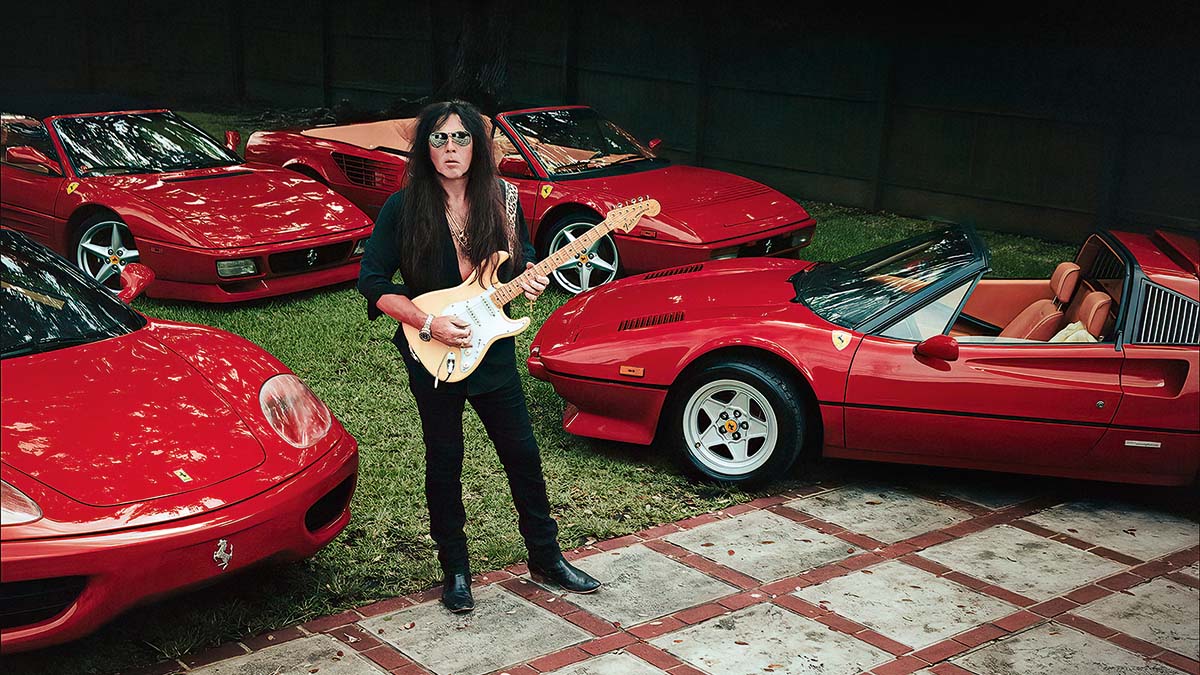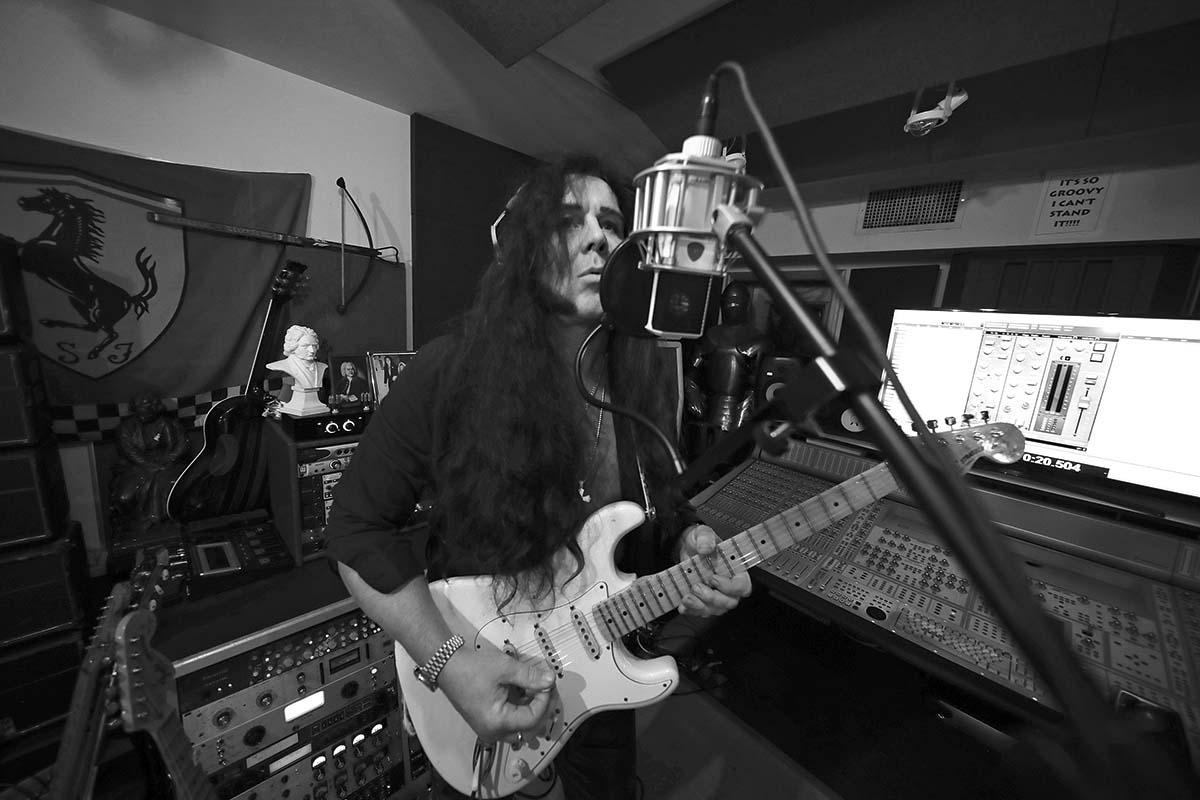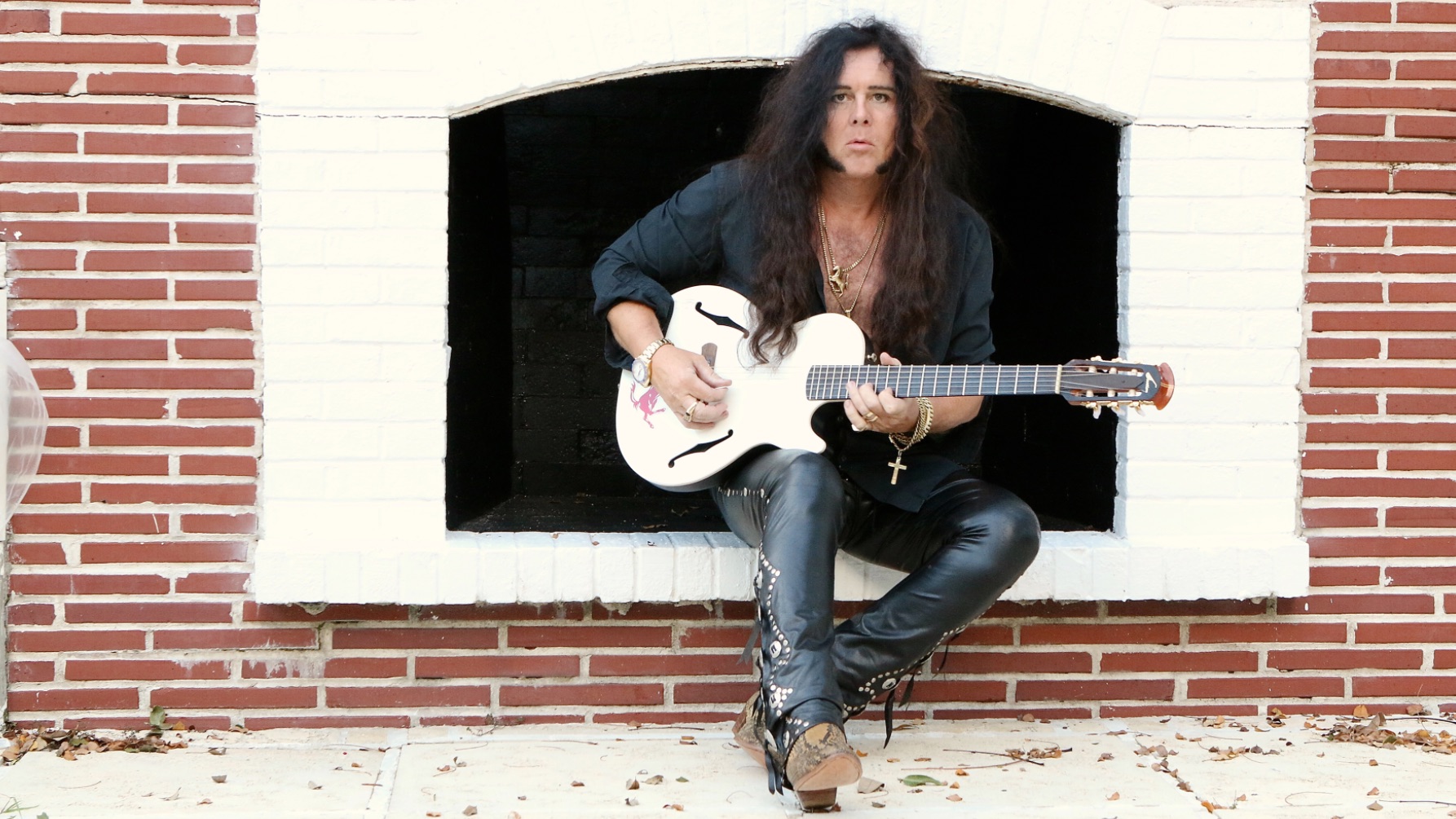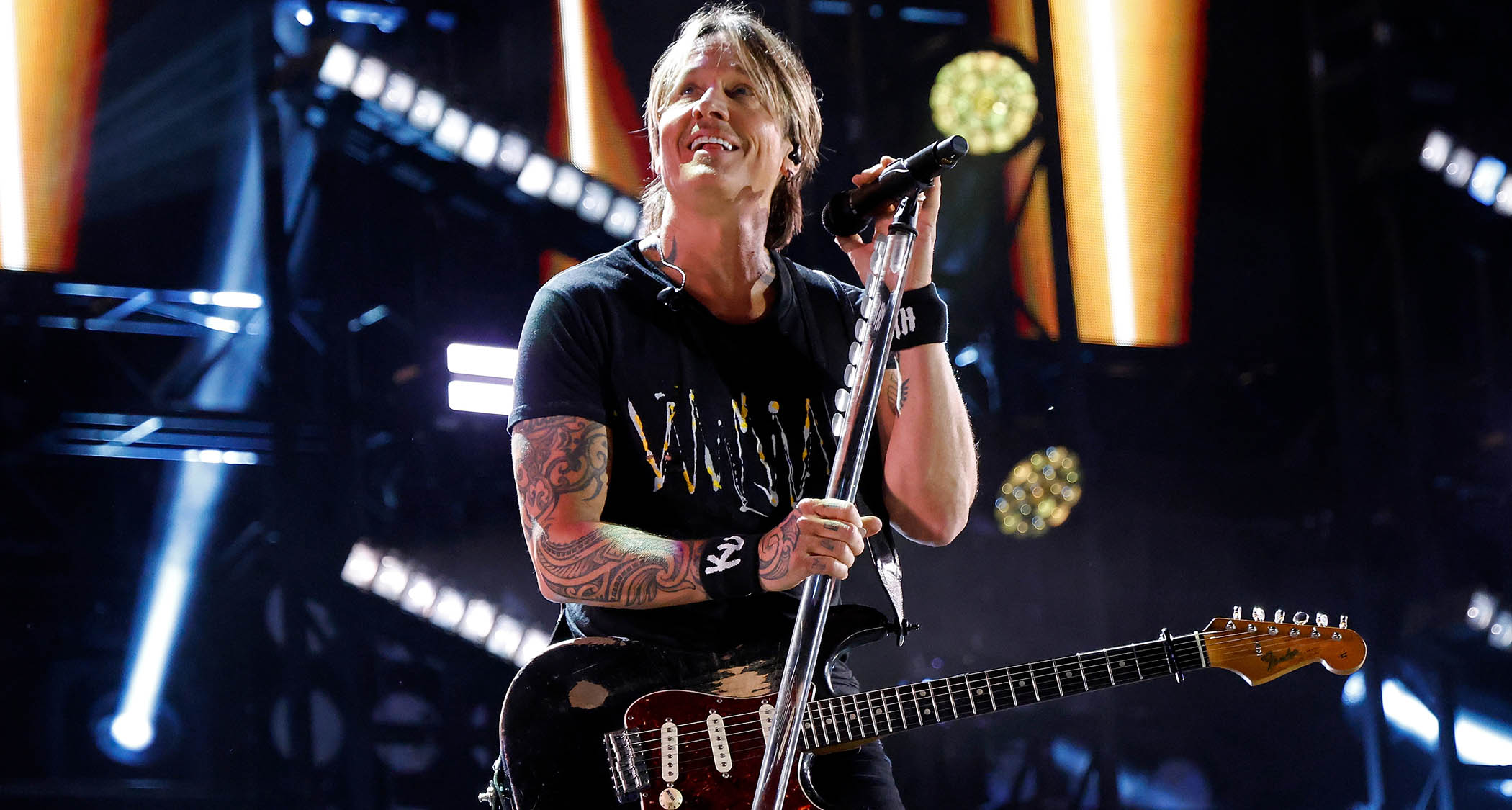Yngwie Malmsteen: "There are two man-made objects you’re gonna see from space: the Great Wall of China and my wall of Marshalls. My road crew hates me!"
The shred master reflects on some of his career highlights in his own words, and offers a lesson in why you should never put the whole band in first class on a long-haul flight

He’s the Swedish wizard whose neo-classical flash turned the 80s shred scene on its head. Now, as Yngwie Malmsteen releases new album, Parabellum, he looks back on first Strats, scalloped fretboards, crashed sports cars, and his notorious ‘air rage’ spat....
I’m A Boy
“As a kid, I’d already played the piano, the trumpet, all that. I didn’t like any of it, it was horrible. But guitar felt like a natural thing to me. I was only seven, and already had a guitar, when I saw Jimi Hendrix smashing up his Strat on TV – but that was only a visual influence, not a musical one.
“Next, I found a blues album in my mother’s collection by John Mayall’s Bluesbreakers and that was amazing. When I was eight, I got Deep Purple’s Fireball, and by the time I was nine I could play all that inside out, on my head. Then I started listening to old Genesis albums like Selling England By The Pound, and understood that the chord progressions and melodies were much more advanced than the five-note pentatonic scale.”
Classical Gas
“I became an aficionado of Bach and Beethoven, but when I heard Paganini, that was the biggest moment. Nobody was playing those crazy arpeggios. Everybody was just playing the box. But I wanted to play that shit on guitar. Sweden, at the time, was a quasi-socialist country, very anti-everything.
“But one day, when I was 12, there was a solo violinist on TV, just one Russian guy playing Paganini’s 24 Caprices. Back then there were no VCRs, so I took a boom-box with a built-in microphone and put that in front of the TV to record it. You’ve got to understand, there was no internet, there was nothing. You had to learn everything by yourself.”
The F Word
“The first guitar I ever wanted was a Fender Stratocaster. As far as I was concerned, I wasn’t even considering anything else. But I couldn’t afford one. So I would buy copies when I was a little kid.
“When I was 12 or something, my mum wanted to have the house repainted. And I asked her, ‘Well, how much are you gonna pay the painters?’ ‘Two grand.’ So I said, ‘Tell the painters to go to hell. You can pay me instead.’ So then I had the money to get a Strat. It was actually a kind of shitty guitar. Eventually, I found a better one.”
All the latest guitar news, interviews, lessons, reviews, deals and more, direct to your inbox!
Practice Makes Perfect
“When I was nine, I used to play in bands where everybody else was 25. But my technique didn’t happen overnight. I was totally relentless. I was falling asleep with the guitar. Waking up with it still on me – and just keep on playing. I was playing on the subway.
“It was crazy. I don’t know whether Vai practised more than me, but I would say, as far as actually spending time with the guitar, it was every waking moment. I sacrificed things for the guitar, for sure. Most people thought I was completely mad.”
String Theory
“I haven’t thought about stuff like modes since the '70s. That stuff is hardwired. I know it all: I know the theory, I know how it all works, I know the mathematical structures of everything. But I don’t think about that. I just know where to go and where not to go – and I always try to find a way of getting there that’s different from what I did before.”
Coming To America
“When I first came from Sweden to America in 1982, I was in a very run-of-the-mill LA band called Steeler. I remember, 30 people came to our first show, but one week later we played the Troubadour and from the dressing room window, I was looking down the street and there was a line around the block. I asked the bartender, ‘Hey, who’s playing in town tonight?’ And the guy says, ‘You are.’ That was after one week in America. It was fucking crazy.”
Taking Control
“One morning, I get a call asking me to audition for Graham Bonnet’s new band, Alcatrazz. I walk in the room and start ripping it up and they look at me like I’m crazy, again. So I tell them, ‘Okay, I’ll join on two conditions: I write the songs and we get a new drummer.’ I was setting the terms, this cocky 19-year-old kid. Crazy!
“Every song, every vocal melody, everything you hear on that first album, No Parole From Rock ‘N’ Roll – I wrote that. That band was supposed to be Graham’s thing, but I totally took over and he was really pissed off. He tried to sabotage my performance a few times, but that’s a long story. It is what it is.
“My first solo album, 1984’s Rising Force, was already half-done when I was out on the road with Alcatrazz. My style of writing and playing was already very much shaped. It’s just matured now – that’s all.”
The Dark Ages
“My car crash of 1987 was a horrible thing. But worse things happened to me at the same time. First, I had that car accident. Then my mother died. Then I was ripped off for all my money. It was just a horrible time, y’know? But when you’ve been struck down that hard, you either come back stronger – or you don’t. If you put an obstacle in front of me, I will crush it and I will go forward. I am impossible to stop. I cannot be stopped.”

Sign Your Name
“When I became well known, every company in the world – Gibson, you name it – said, ‘Whatever guitar you want, we’ll make it for you.’ I told them, ‘No, thanks. I’d rather pay for a Fender Strat.’ Up to that point, Fender never gave a guitar to anybody for free. They didn’t give guitars to Beck, Clapton… it was like, you fucking buy it yourself. So, one, I was the first guy to ever get a guitar free from Fender, and two, I was the first guy to get a signature model. I was very honoured by that, actually. So my being stubborn paid off.”
High Flyer
“There’s no doubt I’d react differently now, but the ‘air rage’ incident of 1988 is still funny as shit. Here’s the part that people might not know. I fly first-class and the band and crew flies coach – that’s the way it is. But back then, some knucklehead decided to put everybody in first class.
“The flight to Japan is 16 hours – and everybody gets shit-faced. I was drinking then, too, and I’m sure I wasn’t perfect, but I definitely wasn’t the biggest problem, either. So I fall asleep and this woman decides to take a pitcher of iced water and pour it over me, saying, ‘Cool down, boys!’
“So I totally lose it. But it’s always the same. One time, I was in a bar and the drummer starts throwing beer at people, but they threw my ass out – because I’m the face of the band.”
Go Deep
“People thought I was crazy to scallop my frets. They really did. But when I was growing up, I was also building model aeroplanes and shit like that, so I was really good with wood, making things, fixing things, painting things. I once saw an old lute from the 16th century and I don’t know why but the wood was carved out in between the frets.
“I had some old necks lying around that I’d probably smashed up on stage. So I scalloped them and it felt like I could really grab the strings, so I did it on my good necks, too. And I thought, ‘Fuck, this is great.’ Basically, it’s like having very, very large frets.”

Stack Attack
“If you went up into space and you looked down on Earth, there are only two man-made objects that you’re gonna see: the Great Wall Of China and my wall of Marshalls. My road crew hates me. Seriously. Here’s the thing, I love all Marshalls. But what happened was, when I was a little kid I didn’t have a lot of money. I couldn’t afford a Marshall. Then Marshall brought out the Master Volume.
“When that amp came out, everybody and their mother wanted one. So the Super Leads and Plexis were worth, like, 50 bucks. So I started buying them. Of course, I just wanted a Marshall.
“But then I realised the preamp and the power amp work in linear – one is not working harder than the other – whereas on a Marshall with a master volume, you have the preamp working full capacity and the power amp working, like, one per cent. Therefore, the power amp tubes are not distorted and that’s why you don’t get the same sound. That pure, violin-type sound – that’s the tone.”
Big In Japan
“I was already an accomplished guitar player in 1977 and that’s when the punk wave came – so the grunge movement of the early 90s was déjà vu for me. At that time, I didn’t have a label, I had nothing, so I spent a lot of time in Japan and did a lot of work there. And I did really well.
”I was No 1 in the charts. I had quadruple-platinum albums. I was playing the biggest Japanese tours of anybody, ever. I was completely successful there. And in South America, also. Europe, to some extent, but not so much.
”But America was pretty much a lost cause at the time. The thing is, I don’t change my direction or change my vision for anybody. You can listen to something else. This is what I do. I don’t follow trends. I make trends.”

Anything Goes
“I don’t have any rules when it comes to writing instrumental guitar music. More than anything, I like the spontaneous moments when I’m improvising and something just comes out and I’m like, ‘That’s cool’ or ‘That’s shit.’ I could write you a country and western song right now if you want. I know how to do that. I have the knowledge to do it. But that, to me, is not the magical moment.”
Music, Maestro!
“I was so proud of Concerto Suite For Electric Guitar And Orchestra [1998] because I spent a lot of time composing and orchestrating all the pieces for the whole orchestra, and all the guitar parts, too. So it was a long procedure of writing and arranging, all this instrumentation. Then I got a symphony conductor to come in and we went to Prague – it was crazy and just a great moment. It didn’t test me as a guitarist, really. I would say it would be more testing as a composer.”
The Fast Show
“I had a good time on the G3 tour of 2003 [with Joe Satriani and Steve Vai]. To me, it’s only half the work. Normally, I play for two hours. So to play for just 45 minutes, it’s like, ‘All right, whatever. I’ll do it standing on my head.’ Same thing with Generation Axe. It’s easy work. I consider guys like Vai and Satriani friends, not rivals. I was on the phone with Vai yesterday, actually. We’re very close.”
Changing Lanes
“The guitar is still a part of my universe. I couldn’t imagine a life any different. But now I have many other things that balance my whole life. Because what happens then is, when you do get into the studio or hit the stage, there’s so much more passion and excitement there than if you just played guitar all day long.
“I do play guitar pretty much every day, but I have a lot of other things, too. I love Ferraris, collecting guns, watches, tennis – a lot of weird shit like that. And I spend a lot of time with my wife and son, of course. So the guitar isn’t a 100 per cent, but it’s always there.”
The Long & Winding Road
“The funny thing is, I probably exceeded all my expectations a thousand times. Not in my wildest dreams did I ever think this would be happening – that 40 years later I’d be driving around in my car, talking to you about my new album. I never thought that would happen.”
- Parabellum is out now via Mascot/Provogue.
Henry Yates is a freelance journalist who has written about music for titles including The Guardian, Telegraph, NME, Classic Rock, Guitarist, Total Guitar and Metal Hammer. He is the author of Walter Trout's official biography, Rescued From Reality, a talking head on Times Radio and an interviewer who has spoken to Brian May, Jimmy Page, Ozzy Osbourne, Ronnie Wood, Dave Grohl and many more. As a guitarist with three decades' experience, he mostly plays a Fender Telecaster and Gibson Les Paul.

